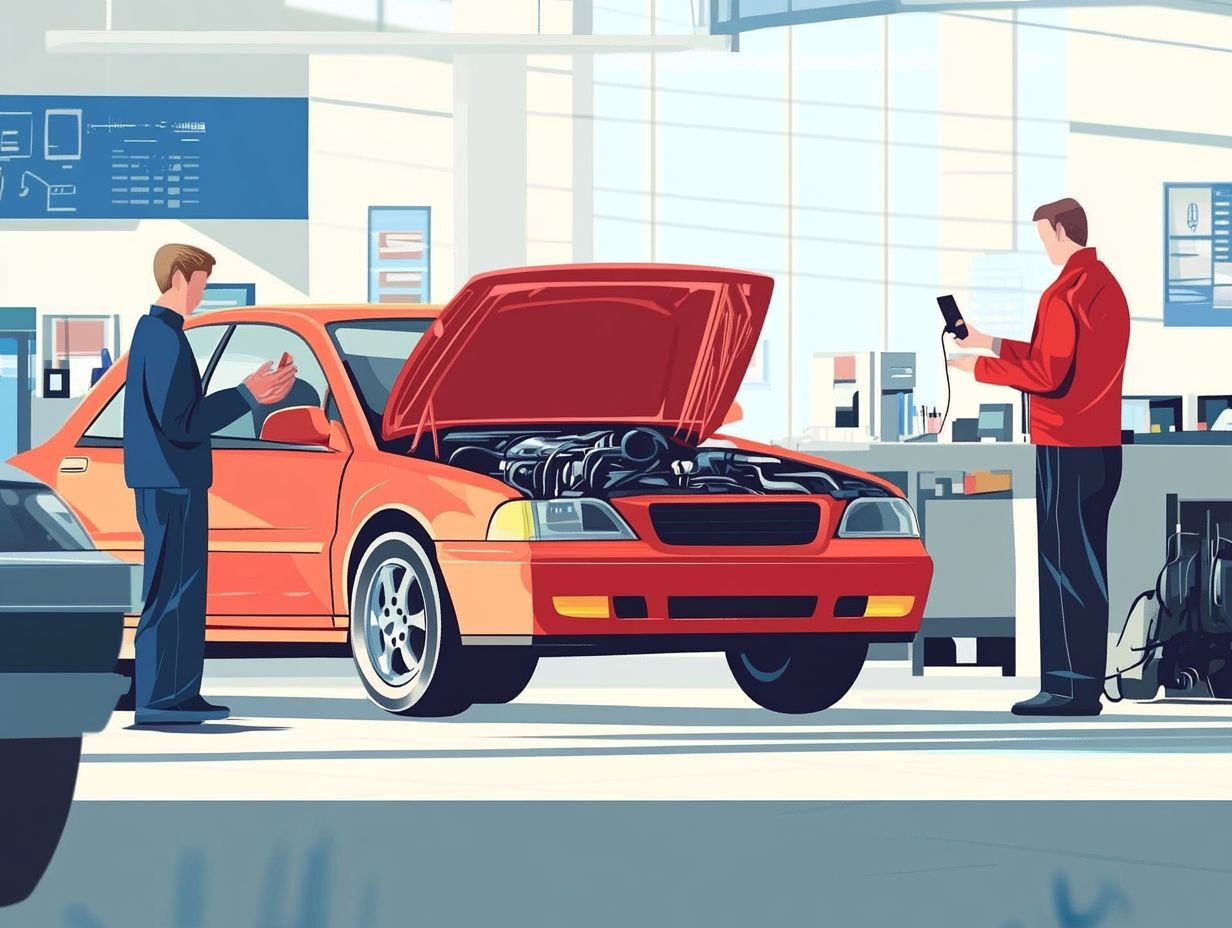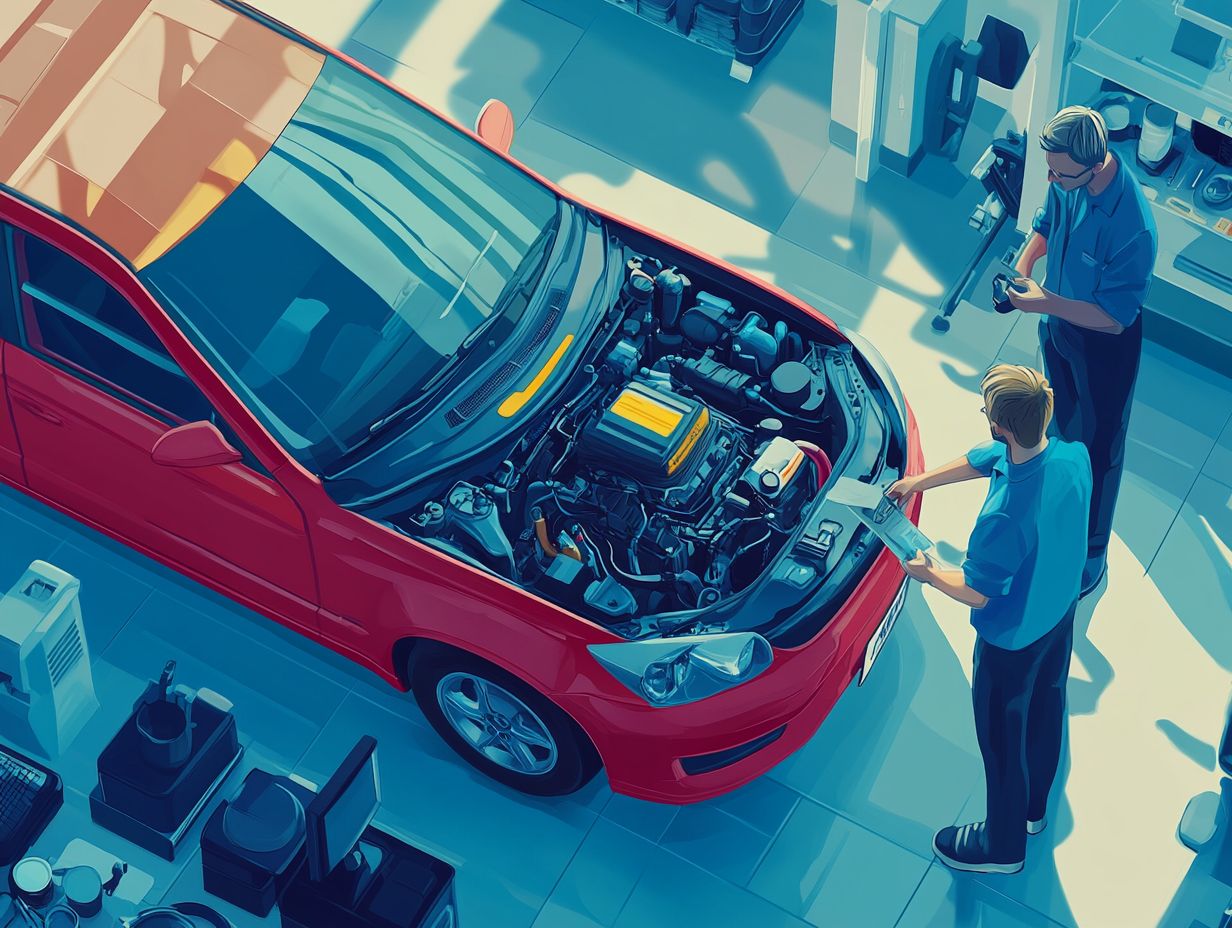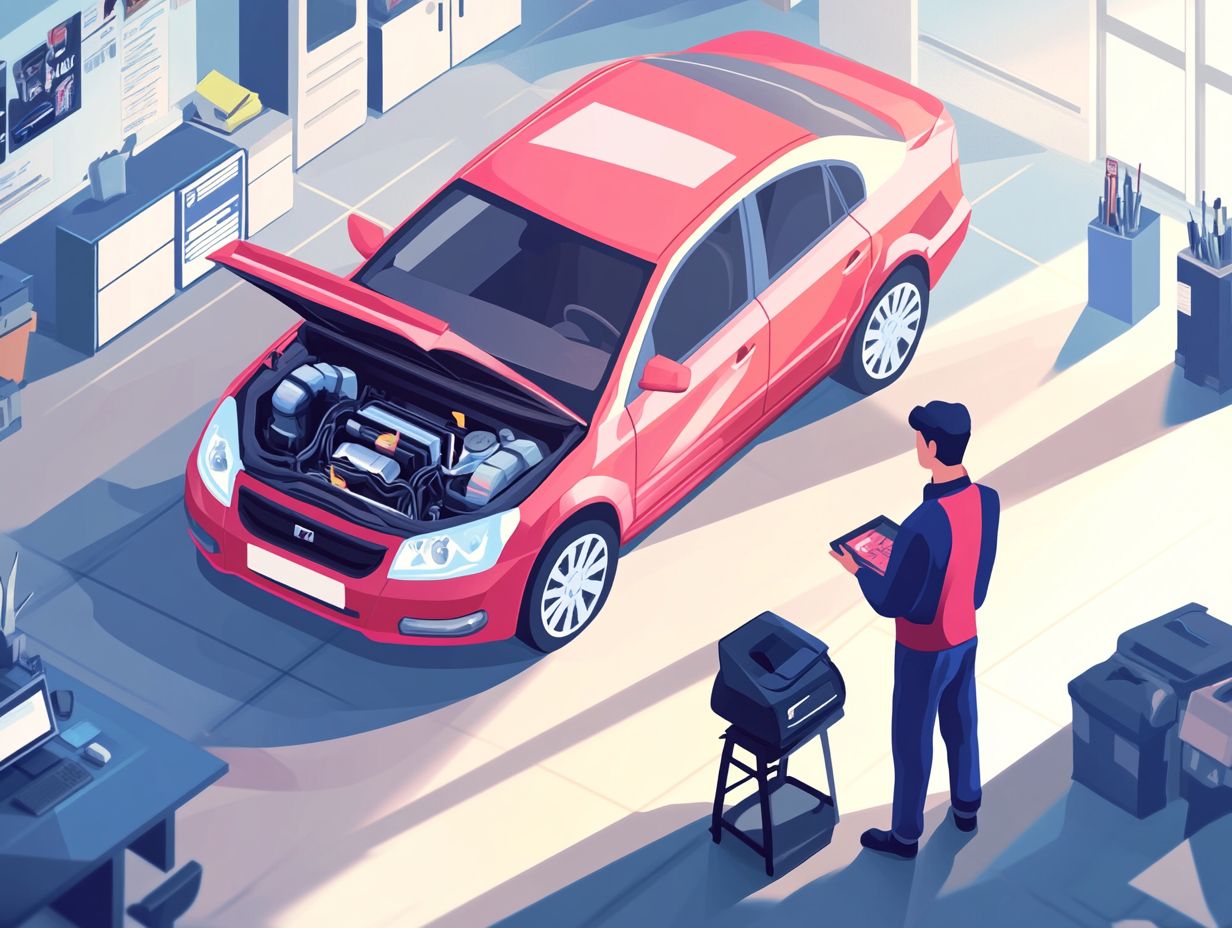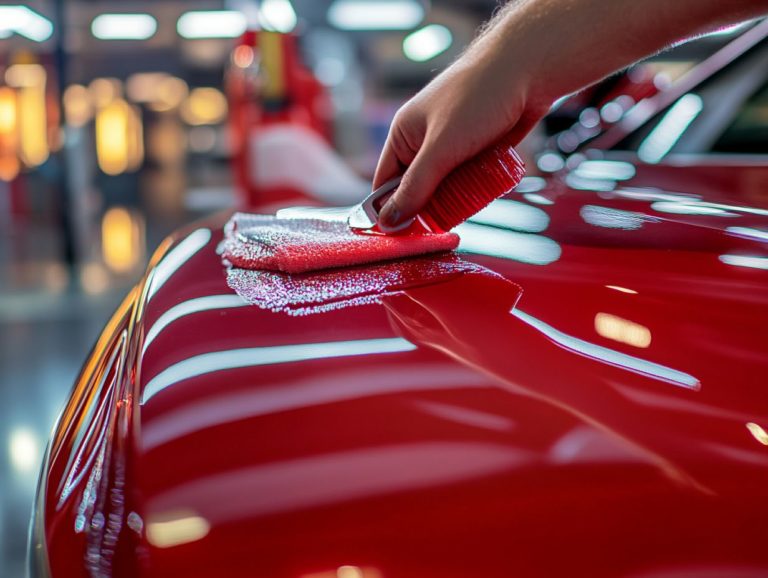What to Check Before Buying a Used Car
Buying a used car can feel overwhelming. However, with the right knowledge in your toolkit, the journey can transform into a seamless and rewarding experience.
It s vital to understand the key factors to consider before making a purchase. Meticulously inspect both the exterior and interior for any signs of wear.
Delving into a vehicle’s history through VIN and Carfax reports is essential. Knowing how to take a thorough test drive and employing effective negotiation strategies is also crucial.
Equip yourself with these essential insights and you ll be well-prepared to drive away with confidence!
Contents
Key Takeaways:

- Do your research before buying a used car. Consider factors like mileage, age, and maintenance history to make a smart buying choice.
- Inspect the exterior of the car for any signs of damage or wear and tear. This can help you avoid costly repairs in the future.
- Examine the interior for functionality and maintenance. Check for any issues with the engine, brakes, and other important components.
Researching Used Cars
Get ready to dive into the exciting world of used cars! Researching used cars requires a thoughtful and thorough approach to guarantee that you make a smart buying choice.
This journey involves looking into the used car market, understanding the vehicle’s history, and leveraging online research tools to compare prices and features effectively.
Before you finalize your choice, it’s crucial to gather information on safety ratings and insurance costs. Ensure the vehicle fits seamlessly into your budget.
Resources like Consumer Reports and automotive service reviews will be invaluable in helping you identify certified used cars, which means the car has been inspected and comes with a limited warranty, and uncover any potential hidden issues.
Factors to Consider Before Buying
Before you dive into the world of used car shopping, it’s important to know what to expect during a used car inspection. These key factors can ensure a satisfying purchase and a wise investment.
First, take a close look at the vehicle’s safety rating your well-being is paramount. Don t forget to conduct a mileage check and see if the car qualifies as a certified pre-owned vehicle.
This means the car has been inspected and often comes with a warranty for that extra layer of comfort. It s wise to consult an inspection mechanic to uncover any hidden problems that might not be immediately obvious.
A well-prepared features checklist can streamline your decision-making process. Remember, a thorough pre-purchase inspection can reveal long-term issues that could impact safety and reliability.
Using a features checklist is instrumental in assessing the vehicle’s condition and ensuring it aligns with your personal requirements and preferences.
Once you ve pinpointed the ideal vehicle, confident negotiation strategies will help you secure a fair deal fast. Emphasizing the importance of market research and understanding the vehicle’s value can tip the scales in your favor.
By carefully weighing all these factors, you can navigate the complexities of purchasing a used car with greater ease and assurance.
Inspecting the Exterior
Inspecting the exterior of a used car is an essential step in your buying journey. It provides valuable insights into the vehicle s overall condition and uncovers any potential hidden issues.
Begin by meticulously assessing the body for signs of rust, dents, or past repairs. These can hint at deeper problems lurking beneath the surface.
Don’t overlook the safety equipment. Ensure that all lights and mirrors are functioning correctly. This examination helps you spot water damage and strengthens your bargaining power during negotiations, ultimately leading to a smarter purchase.
Now that you’re equipped with these insights, it’s time to hit the road and find your dream used car!
Signs of Damage or Wear and Tear
Identifying signs of damage or wear and tear in a used car is crucial for preventing future repair costs and ensuring the vehicle’s longevity. Pay close attention to inconsistencies in the body condition and any signs of rust or mismatched paint that could hint at past accidents.
Water damage isn t always obvious. Don’t miss out on consulting an inspection mechanic for a deep dive into the vehicle’s condition!
During your visual inspection, be meticulous about the alignment of panels. Watch for signs of body filler, which could indicate repairs from previous collisions. As a savvy buyer, it s essential to assess the condition of seals and trims around doors and windows; these areas can easily trap moisture and lead to corrosion.
Keep an eye out for bubbles in the paint or peeling surfaces they can reveal deeper issues lurking beneath. Relying on an inspection mechanic not only provides you with peace of mind but also equips you with critical knowledge about potential future expenses associated with the vehicle.
Examining the Interior

Examining the interior of a used car is as vital as inspecting its exterior. It offers invaluable insights into the vehicle’s overall condition and maintenance history.
Focus on the engine’s state. Make sure all electronic components like the air conditioning and infotainment systems are in perfect working order.
A thorough check inside the car should also encompass checking the upholstery and dashboard for any signs of wear and tear. Ensuring that every feature on your checklist operates flawlessly can significantly influence your final purchase decision.
Checking for Functionality and Maintenance
Checking for functionality and maintenance is essential when considering a used car, as it directly impacts your ownership experience and long-term expenses. Start by testing all the critical features make sure the audio system, air conditioning, and navigation tools are in tip-top shape.
Don t hesitate to ask for the vehicle s maintenance records. These documents can offer invaluable insights into past repairs and potential concerns that may arise.
Involving a qualified inspection mechanic is also wise. They can provide you with a reliable estimate for any necessary work. This process typically includes a thorough examination of the vehicle s systems to confirm that everything is functioning properly.
The inspection mechanic will assess the current state of various components and delve into the maintenance history, revealing patterns or recurring issues that could signal future problems.
Detailed records often highlight crucial repairs and preventative services performed, helping you piece together a complete picture of the vehicle’s health. By understanding these aspects and considering the mechanic’s insights, you equip yourself to make informed decisions about the overall condition and anticipated repair costs. Don t wait, start your inspection checklist now to find the perfect used car!
Assessing the Vehicle’s History
Assessing the history of a vehicle is a critical step in the used car buying journey. It allows you to uncover past issues that may influence your decision.
Begin by performing a thorough VIN check (Vehicle Identification Number) using resources like CARFAX, which delivers in-depth reports detailing vehicle recalls, accident histories, and title discrepancies. Grasping the recall status is essential for confirming that the vehicle adheres to safety standards.
Turning to Consumer Reports provides valuable evaluations and insights, steering you towards informed financial choices when dealing with financial institutions.
Using VIN and CARFAX Reports
Using the Vehicle Identification Number (VIN) and CARFAX reports is an essential step in making an informed decision when purchasing a used car. These resources offer a treasure trove of information about the vehicle’s history.
The VIN acts as a unique identifier that links you to a comprehensive vehicle history report. This allows you to explore details such as previous accidents, servicing, and title history. CARFAX can even alert you to any vehicle recalls that might affect safety and reliability, so you are fully informed of potential issues before you seal the deal.
By looking into these reports, you can unearth red flags like odometer discrepancies, which may signal tampering. Make sure to keep an eye on how many previous owners the vehicle had; a high turnover could hint at underlying problems.
You should also examine service records to determine if the car has been well-maintained over the years. A history of lemon law buybacks is certainly a significant warning sign.
Ultimately, leveraging the insights from VIN and CARFAX reports gives you the power to make confident, safe investments in your next used vehicle.
Test Driving the Car
Test driving the car is a crucial step in your buying journey. It gives you the chance to evaluate the vehicle’s functionality and overall performance firsthand.
During the test drive, focus on how the car accelerates, brakes, and navigates turns. These elements play a significant role in shaping your driving experience.
Consider bringing a mechanic to inspect the car after your drive. This approach can help uncover any hidden issues that might not surface during a brief spin and equip you with invaluable insights for good negotiation skills, tailored to your budget plan.
Tips for a Thorough Test Drive

Conducting a thorough test drive is essential for understanding the vehicle’s functionality and ensuring it aligns with your expectations.
To truly maximize the effectiveness of your test drive, vary your driving conditions. Navigate through urban environments to evaluate how the car performs in stop-and-go traffic, then hit the highways to see how it handles at higher speeds.
Pay close attention to blind spots, how comfortable you feel during turns, and how effectively the car absorbs bumps or rough patches in the road. Take note of the sound levels inside the cabin are there any distracting noises that could spoil your driving experience?
By gathering these insights, you will not only bolster your confidence in your choice but also arm yourself with valuable information for negotiations, potentially helping you secure a better price.
Negotiating the Price
Negotiating the price of a used car is not just a routine task; it s an important step that can affect how much you spend. Mastering good negotiation skills becomes essential for securing the best possible deal.
Begin by establishing a sensible budget, grounded in meticulous research on price trends and repair estimates for comparable vehicles in the market. Leverage this knowledge to advocate for a lower sticker price.
Keep in mind that banks can offer helpful information regarding payment options and potential car insurance quotes, all of which should be integrated into your financial strategy.
Don’t skip this step; it could save you from future headaches! Take action now and be smart do your research before you buy!
Strategies for Getting a Fair Deal
Implementing effective strategies for securing a fair deal on a used car can lead to substantial savings and a satisfying purchase experience. Begin by researching the vehicle s market value the average price a used car sells for in your area and obtaining a repair estimate that outlines potential maintenance costs. This information can serve as your negotiating leverage.
Present a well-defined budget plan to the seller, emphasizing your readiness to buy if they can lower the sticker price. This approach ultimately paves the way for a more advantageous transaction.
Effective communication is crucial during negotiations. Engaging in friendly dialogue fosters goodwill, making the seller more receptive to your proposed terms. When discussing your research findings, be polite yet assertive. Clearly articulate how your evidence of market value and repair estimates support your price point. By demonstrating that you are informed and prepared, you can discourage the seller from clinging to inflated pricing.
As you navigate the negotiation, stay flexible and open to counteroffers. This allows room for compromise that satisfies both parties and ensures a fair deal.
Frequently Asked Questions
What should I check before buying a used car?
Before buying a used car, check the vehicle’s history, test drive it, inspect its physical condition, and research its market value.
How can I check a used car’s history?

You can check a used car’s history by obtaining a vehicle history report. This report provides information on the car’s ownership, accident history, and service records.
What should I look for during a test drive?
During a test drive, pay attention to the car’s handling, brakes, acceleration, and any strange noises or vibrations. Also, test all the car’s features to ensure they are in working condition.
How do I inspect a used car’s physical condition?
Inspecting a used car’s physical condition is crucial; check its exterior for dents, scratches, or rust, and its interior for tears or stains. Additionally, when you’re ready to take a test drive, remember to consider what to look for when test driving a car, including any signs of leaks or damage under the hood.
What factors can affect a used car’s market value?
The age of a used car can significantly impact its market value, so check this before you negotiate! Other factors include mileage, condition, and demand for that particular make and model. Any additional features or modifications can also affect its value.
Is it important to research a used car’s market value?
Yes, researching a used car’s market value helps you negotiate a fair price with the seller and ensures you’re not overpaying for the vehicle. It also gives you an idea of how much the car may cost to maintain in the future.





